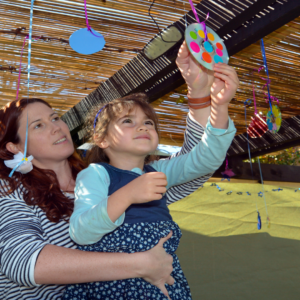Divorce can be a challenging and emotional experience for everyone involved, especially for children who are caught in the midst of changing family dynamics. My daughter was just a baby when her dad and I separated. But when my parents separated, I was seven, and I remember it very well…
As a single mother, supporting your kids through this transition is crucial for their emotional well-being. In this blog post, we’ll explore 10 effective strategies to help your children adjust to separation and to their new family situation.
1. Open and honest communication
One of the most important strategies to help your children adjust to separation steps is to maintain open and honest communication. Let them know that their feelings are valid and that it’s okay to express their emotions. Create a safe space where they can ask questions and share their concerns without fear of judgment. Also, keep in mind that there will likely be MANY conversations about it. And, they may not come right away.

2. Provide age-appropriate information
Tailor your communication to the age and maturity level of each child. Avoid oversharing complex details that might overwhelm them. Instead, offer age-appropriate explanations that help them understand the situation without burdening them with adult matters.
3. Reassurance and stability
During times of change, children often seek reassurance and stability. Emphasize that your love for them remains unchanged, and focus on maintaining consistent routines as much as possible. Predictability can help alleviate anxiety and create a sense of security.
4. Encourage expression through art and play
Younger children might find it challenging to verbalize their emotions. Encourage them to express themselves through art, play, or even storytelling. This allows them to externalize their feelings and gain insights into their emotions.

5. Be attentive to behavioural changes
Children may display changes in behavior as they navigate the new family dynamic. Watch out for signs of withdrawal, aggression, or difficulty concentrating. These changes can indicate underlying emotional struggles that need to be addressed. The school or daycare may also notice changes. So it’s worth keeping them informed of the situation, so they can keep an eye out.
6. Support their relationships
Maintain a positive attitude towards your ex-spouse, especially in front of your children. Encourage and support their relationship with the other parent, as a healthy co-parenting relationship can significantly ease their adjustment. Never bad mouth your ex (as tempting as it might be), even if you hear about them bad-mouthing you. When you put down the other parent, it can be quite confusing and even damaging for kids. It is upsetting for them, as they are half their other parent, and keeping your mouth shut helps to ensure that you remain a safe space for them to talk and be themselves. One day your kids will remember!
7. Get them professional help if needed
If you notice persistent emotional struggles or signs of distress, consider seeking a professional to help your children adjust to the separation too. A child therapist or counselor can provide a safe space for your children to express their feelings and develop coping strategies.

8. Foster a sense of independence
Empower your children by involving them in age-appropriate decision-making. For a younger child, this might look like giving them two options for what to do on your Saturday and letting them pick. For an older child, perhaps it’s having them help redecorate or pick out some new furniture. This helps them feel a sense of control and independence during a time when much of their world might feel out of their control.
9. Create new positive traditions
Another strategy to help your children adjust to separation and to help create a positive association with their new family dynamic is to establish new traditions or activities that you can enjoy together. Maybe it’s a hot chocolate or ice cream after school on a Friday, a weekend pizza and movie night, or a Saturday morning farmers market visit, for example. This gives your children something to look forward to and fosters a sense of belonging.
10. Model resilience and coping skills
Your children learn from watching you. Demonstrate healthy coping skills, such as stress management techniques, self-care, boundaries, effective communication, and problem-solving. By modeling these behaviors, you provide them with valuable tools for navigating challenges.
Supporting your children as they adjust to a new family dynamic is a journey that requires patience, understanding, and empathy. By implementing these strategies and prioritizing open communication, stability, and emotional well-being, you can help your children not only cope but thrive in their changed circumstances. Remember that it may take time for your children to adjust to separation, and every child’s experience is unique, so try to be attentive and adaptable to their needs throughout this process. Best of luck!
P.S. DID YOU KNOW?
Thrive Tribe – the global membership experience for single mothers – will be opening again for enrolment later this year. Join the waitlist here.

Know someone who needs to read this? Share it with them via the links below.
